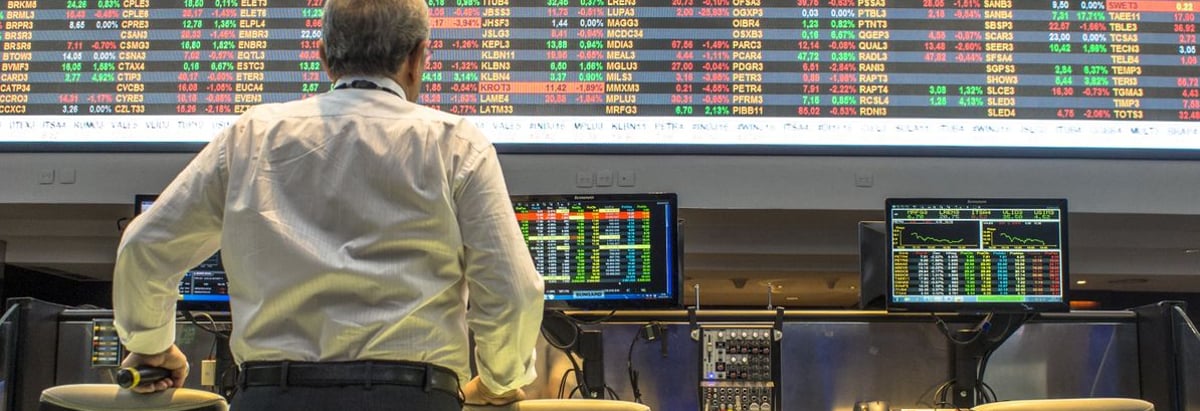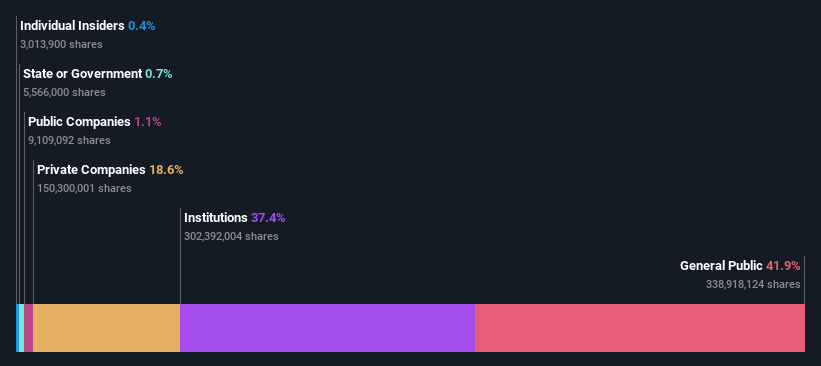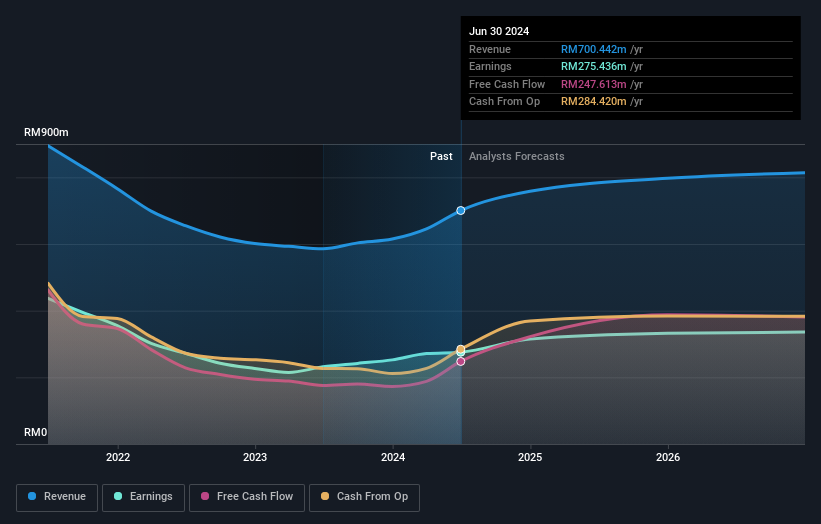- Malaysia
- /
- Capital Markets
- /
- KLSE:BURSA
Bursa Malaysia Berhad (KLSE:BURSA) surges 3.5%; retail investors who own 42% shares profited along with institutions

Key Insights
- Bursa Malaysia Berhad's significant retail investors ownership suggests that the key decisions are influenced by shareholders from the larger public
- A total of 8 investors have a majority stake in the company with 50% ownership
- Institutions own 37% of Bursa Malaysia Berhad
To get a sense of who is truly in control of Bursa Malaysia Berhad (KLSE:BURSA), it is important to understand the ownership structure of the business. We can see that retail investors own the lion's share in the company with 42% ownership. Put another way, the group faces the maximum upside potential (or downside risk).
Following a 3.5% increase in the stock price last week, retail investors profited the most, but institutions who own 37% stock also stood to gain from the increase.
Let's take a closer look to see what the different types of shareholders can tell us about Bursa Malaysia Berhad.
Check out our latest analysis for Bursa Malaysia Berhad

What Does The Institutional Ownership Tell Us About Bursa Malaysia Berhad?
Institutional investors commonly compare their own returns to the returns of a commonly followed index. So they generally do consider buying larger companies that are included in the relevant benchmark index.
We can see that Bursa Malaysia Berhad does have institutional investors; and they hold a good portion of the company's stock. This implies the analysts working for those institutions have looked at the stock and they like it. But just like anyone else, they could be wrong. If multiple institutions change their view on a stock at the same time, you could see the share price drop fast. It's therefore worth looking at Bursa Malaysia Berhad's earnings history below. Of course, the future is what really matters.

Hedge funds don't have many shares in Bursa Malaysia Berhad. Looking at our data, we can see that the largest shareholder is Capital Market Development Fund with 19% of shares outstanding. For context, the second largest shareholder holds about 11% of the shares outstanding, followed by an ownership of 9.9% by the third-largest shareholder.
We did some more digging and found that 8 of the top shareholders account for roughly 50% of the register, implying that along with larger shareholders, there are a few smaller shareholders, thereby balancing out each others interests somewhat.
While it makes sense to study institutional ownership data for a company, it also makes sense to study analyst sentiments to know which way the wind is blowing. There are plenty of analysts covering the stock, so it might be worth seeing what they are forecasting, too.
Insider Ownership Of Bursa Malaysia Berhad
The definition of an insider can differ slightly between different countries, but members of the board of directors always count. Company management run the business, but the CEO will answer to the board, even if he or she is a member of it.
Most consider insider ownership a positive because it can indicate the board is well aligned with other shareholders. However, on some occasions too much power is concentrated within this group.
Our data suggests that insiders own under 1% of Bursa Malaysia Berhad in their own names. But they may have an indirect interest through a corporate structure that we haven't picked up on. It is a pretty big company, so it would be possible for board members to own a meaningful interest in the company, without owning much of a proportional interest. In this case, they own around RM28m worth of shares (at current prices). It is good to see board members owning shares, but it might be worth checking if those insiders have been buying.
General Public Ownership
The general public, who are usually individual investors, hold a 42% stake in Bursa Malaysia Berhad. This size of ownership, while considerable, may not be enough to change company policy if the decision is not in sync with other large shareholders.
Private Company Ownership
Our data indicates that Private Companies hold 19%, of the company's shares. Private companies may be related parties. Sometimes insiders have an interest in a public company through a holding in a private company, rather than in their own capacity as an individual. While it's hard to draw any broad stroke conclusions, it is worth noting as an area for further research.
Next Steps:
It's always worth thinking about the different groups who own shares in a company. But to understand Bursa Malaysia Berhad better, we need to consider many other factors. For instance, we've identified 1 warning sign for Bursa Malaysia Berhad that you should be aware of.
Ultimately the future is most important. You can access this free report on analyst forecasts for the company.
NB: Figures in this article are calculated using data from the last twelve months, which refer to the 12-month period ending on the last date of the month the financial statement is dated. This may not be consistent with full year annual report figures.
Valuation is complex, but we're here to simplify it.
Discover if Bursa Malaysia Berhad might be undervalued or overvalued with our detailed analysis, featuring fair value estimates, potential risks, dividends, insider trades, and its financial condition.
Access Free AnalysisHave feedback on this article? Concerned about the content? Get in touch with us directly. Alternatively, email editorial-team (at) simplywallst.com.
This article by Simply Wall St is general in nature. We provide commentary based on historical data and analyst forecasts only using an unbiased methodology and our articles are not intended to be financial advice. It does not constitute a recommendation to buy or sell any stock, and does not take account of your objectives, or your financial situation. We aim to bring you long-term focused analysis driven by fundamental data. Note that our analysis may not factor in the latest price-sensitive company announcements or qualitative material. Simply Wall St has no position in any stocks mentioned.
About KLSE:BURSA
Bursa Malaysia Berhad
An exchange holding company, provides treasury management, and management and administrative services.
Flawless balance sheet with proven track record.


